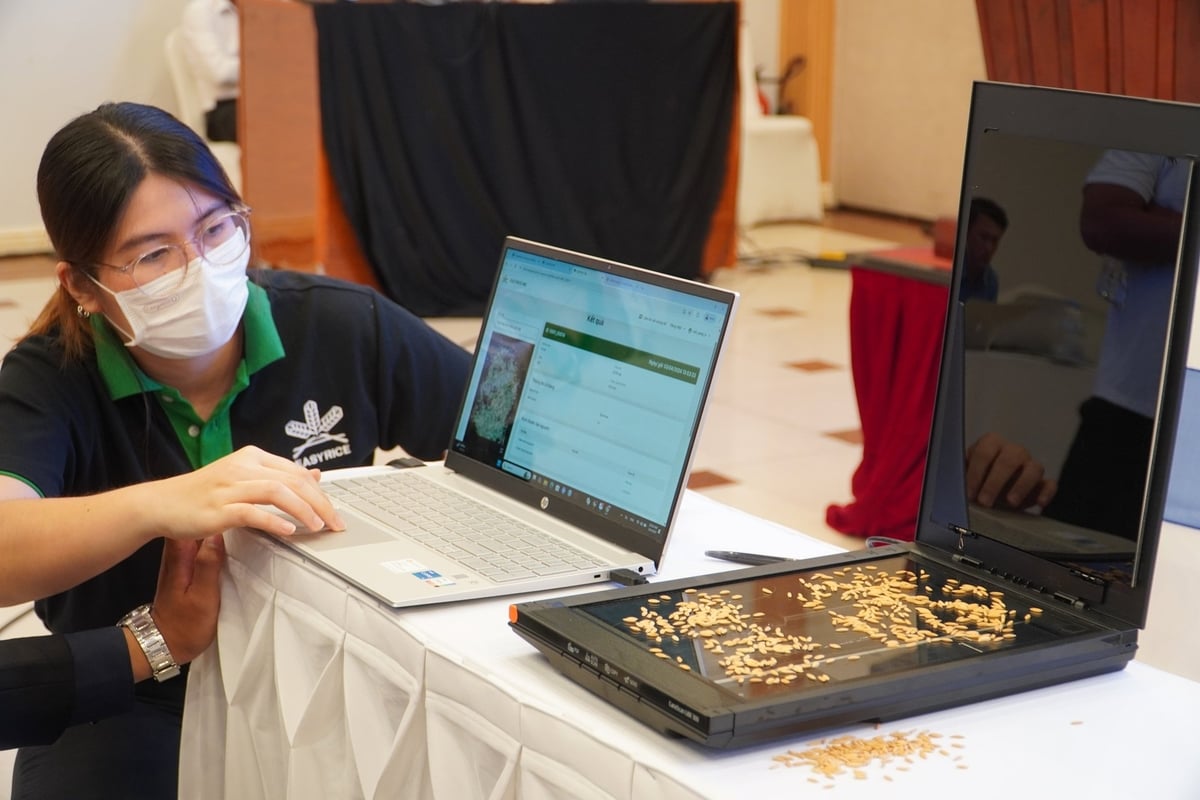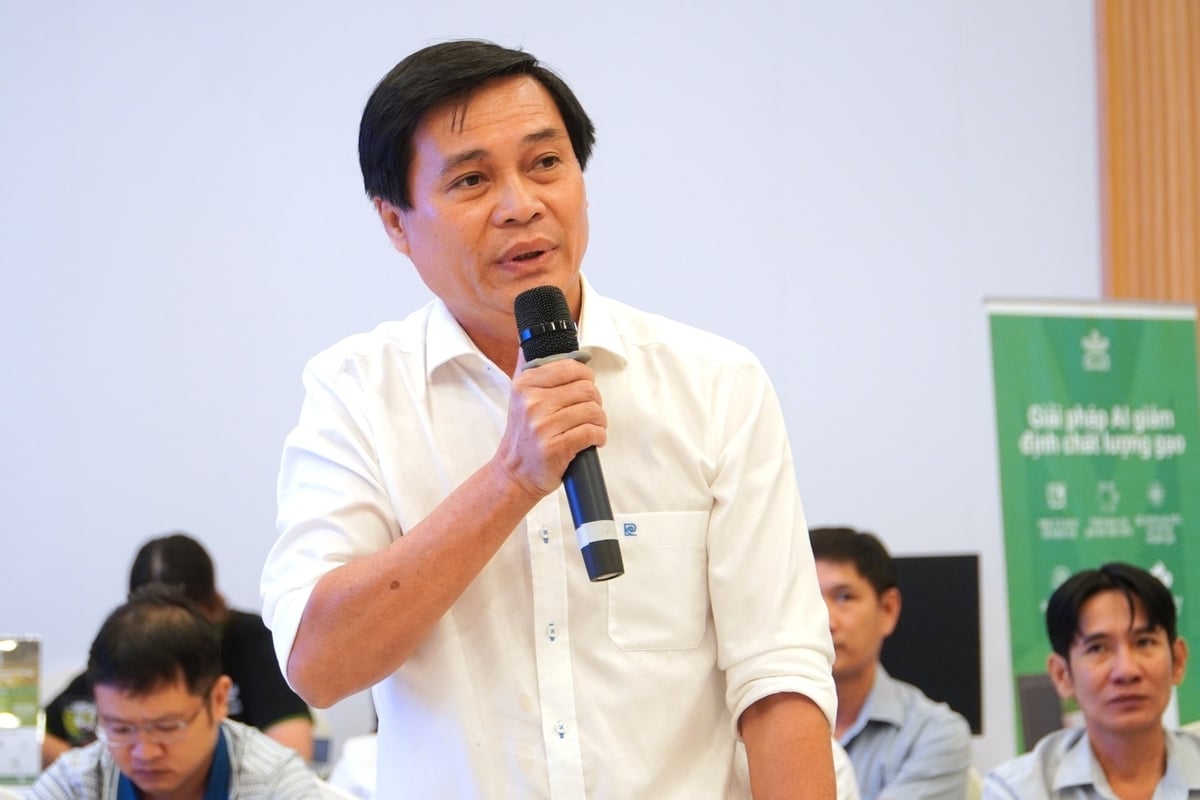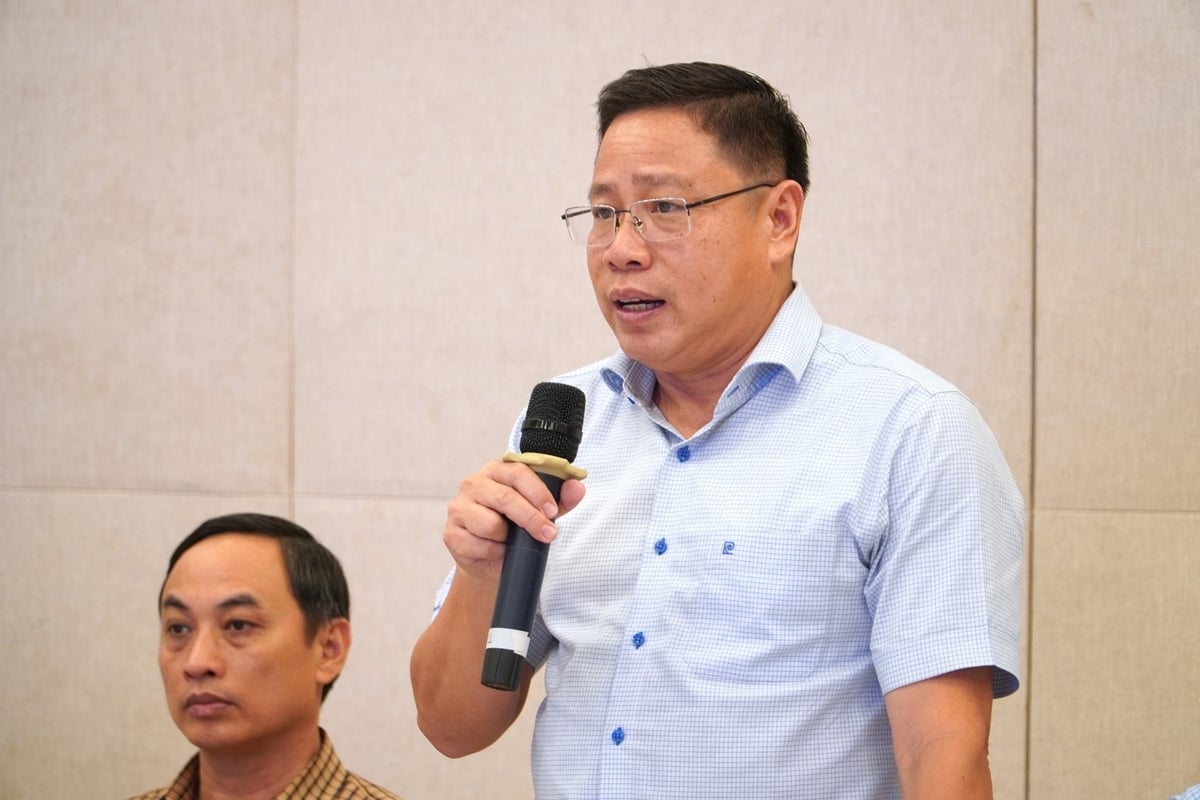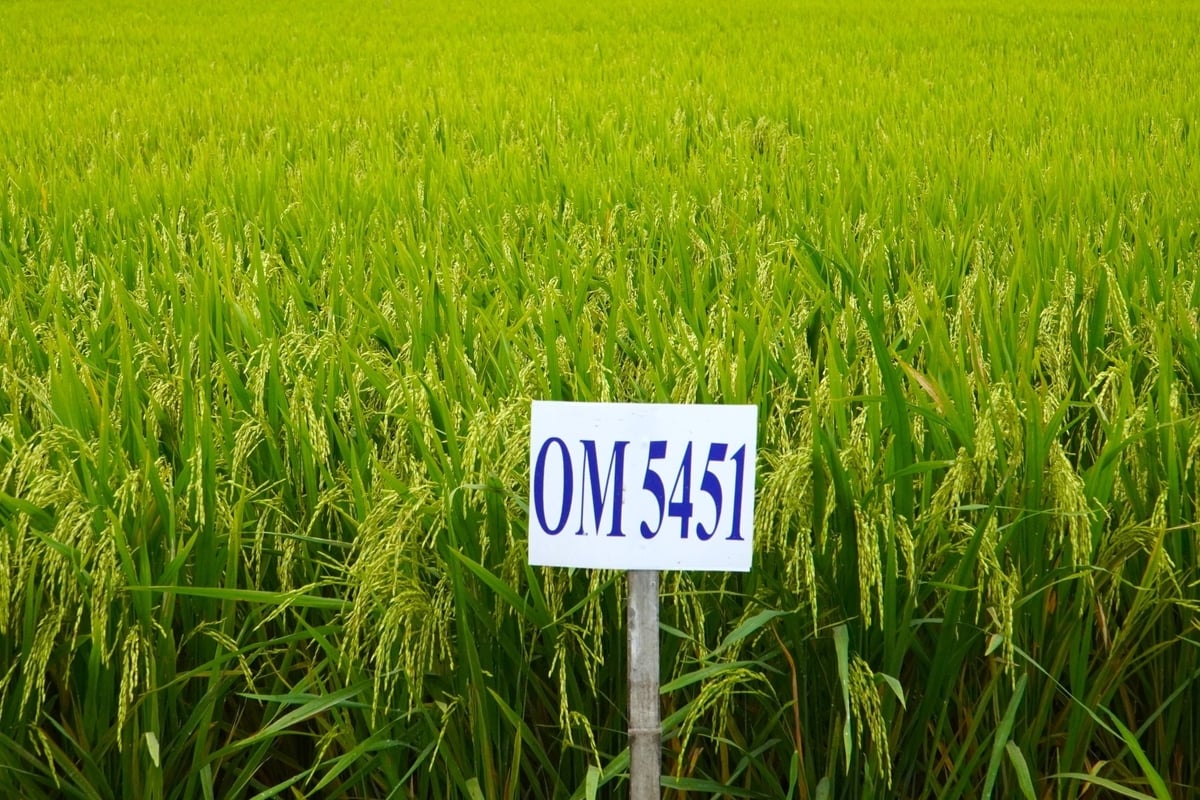December 31, 2025 | 00:20 GMT +7
December 31, 2025 | 00:20 GMT +7
Hotline: 0913.378.918
December 31, 2025 | 00:20 GMT +7
Hotline: 0913.378.918
On September 4, the Vietnam Rice Industry Association (VIETRISA) organized a seminar titled “Scientific solutions to improve rice and rice seed quality.” The key topic that drew attention at the event was the AI-based rice seed testing system (EASYRICE MP1) developed by Easy Rice.
EASYRICE MP1 is a rice seed testing system equipped with artificial intelligence (AI) technology. It helps analyze characteristics as well as seed purity and cleanliness, two critical factors in seed quality assessment.

Demonstration of the AI rice seed testing system to determine seed purity. Photo: Kim Anh.
According to Easy Rice Vietnam, EASYRICE MP1 has already been successfully tested in the markets of Thailand and India. Its outstanding advantages include accuracy above 95% and time efficiency: within 3–5 minutes, it can separate 400–600 rice seeds compared to 30 minutes previously needed to separate just 100 seeds. This delivers rapid results, reduces the risk of errors, and provides reliable and precise outcomes.
In Thailand, this AI system has been in use since 2020. To date, more than 300 companies with over 500,000 applications have adopted the technology, accounting for 30% of Thailand’s rice export market. According to Easy Rice’s calculations, over 10 million tons of Thai rice in recent years have been tested with AI technology to measure seed purity.
In Vietnam, the system is still in its early market entry stage, currently being introduced through solutions for white rice quality inspection.
Specifically, the system includes one scanner to capture images of white rice samples. Users insert an appropriate amount of sample into the machine, which then uses AI to scan. Within 2 minutes, the system generates a complete, detailed report on the physical properties of the rice sample, such as the percentage of impurities, broken rice, and whole grains.

Mr. Dinh Minh Tam, Director of Co May Co., Ltd., the enterprise piloting the EASYRICE MP1 technology, shares about the initial effectiveness. Photo: Kim Anh.
Mr. Doan Anh Vo, representative of Easy Rice Vietnam, noted that there are currently too many rice varieties on the market, making them difficult to distinguish by eye. Seed purity and varietal accuracy are not tightly controlled. Moreover, fake varieties are sold online with misleading claims. Farmers and cooperatives are the first to suffer from inconsistent seed quality, leading to reduced yields. That was the motivation for Easy Rice to develop this solution.
In terms of operating principles, EASYRICE MP1 uses AI to help farmers and cooperatives access more accurate and purer rice varieties. The AI is trained to process data through rice seed images. Once the initial database is built, AI can provide fast, accurate, and transparent assessments based on real data rather than visual judgment.
Co May Co., Ltd. (in Dong Thap province), an exporter and processor of premium rice for the domestic market, was the first enterprise in Vietnam to apply this solution since 2021.

Dr. Tran Ngoc Thach, Director of the Mekong Delta Rice Research Institute, provides suggestions on solutions to develop AI technology in rice seed quality inspection. Photo: Kim Anh.
Mr. Dinh Minh Tam, the company’s Director, said that since the quality control team adopted this technology to check seed conditions, they have almost eliminated the sensory evaluation stage, saving manual labor compared to previous practices.
Although the application of EASYRICE MP1 is seen as a promising approach that supports seed producers, Dr. Tran Ngoc Thach, Director of the Mekong Delta Rice Research Institute, stressed that effective implementation requires building a large database. Currently, hundreds of rice varieties are cultivated across the country, meaning AI must be “trained” to recognize each seed type. In addition, seasonality and weather significantly affect seed shape, so the developers must also ensure AI can identify seeds accurately.
Another critical issue is the collaboration between the developer and the end users. “Enterprises hold the big data. How will they share this database with inspection agencies, cooperatives, and seed producers? If it is monopolized, data sharing will be very complicated. Yet sharing this technology is also part of technological advancement in production,” Mr. Thach remarked.
Therefore, for this technology to be applied, businesses, research institutes, and experts believe that the legal framework must be reviewed and its reliability evaluated with more concrete evidence.

The annual cultivation area of fragrant and high-quality rice varieties reaches over 5.1 million ha. Photo: Kim Anh.
According to the Vietnam Seed Trade Association, Vietnam plants about 7.2 million ha of rice annually, with seed demand ranging from 570,000–580,000 tons, mainly concentrated in fragrant and high-quality rice varieties.
In the northern region, the formal seed production system (enterprises and seed centers) supplies about 80% of demand, equivalent to 65,000–70,000 tons per year.
In the Mekong Delta, the formal seed production system currently meets only about 45% of demand, equivalent to 180,000–200,000 tons per year. In addition, cooperatives and farmer groups produce about 90,000–100,000 tons per year, while the rest must be managed by farmers themselves.
Mr. Tran Xuan Dinh, Vice Chairman of the Vietnam Seed Trade Association, said that 70–75% of seed volume is processed with moderately advanced to modern technology. About 25–30% is still processed manually, resulting in uneven quality. The Mekong Delta in particular remains a “low spot” in seed quality, with the highest proportion of non-formal, non-processed rice seeds in use. Therefore, technological renewal in research and breeding is an essential requirement for future development.
Translated by Huong Giang

(VAN) From extensive shrimp ponds, baskets of don gathered on the mudflats, to boats carrying visitors to watch birds, all livelihoods here depend on clean water, green forests, and the calls of migratory birds.
/2025/12/26/0703-3-204813_117.jpg)
(VAN) Transparency in information and listening to local people have helped address ground clearance bottlenecks and build social consensus, thereby accelerating the progress of the JICA3 irrigation project.
/2025/12/27/0609-3-233846_327.jpg)
(VAN) The JICA3 project is expected to become a 'water shield,' helping control saltwater intrusion, proactively secure water resources, protect livelihoods, and promote sustainable development in coastal areas.
/2025/12/26/5654-3-164509_655.jpg)
(VAN) As Viet Nam makes strong commitments toward achieving net-zero emissions, controlling and reducing methane emissions in livestock production is increasingly becoming a mandatory requirement.

(VAN) 'People, Primates, Plants: Co-managing Biodiversity and Improving Livelihoods in Vietnam' (the PPP Project) is an international initiative implemented in Vietnam by BGCI, CEGORN, and ICRAF/World Agroforestry.

(VAN) Dak Nong established a risk-level zoning map for coffee, built a digital data platform for the sector, and promoted certified production in line with EUDR.
/2025/12/25/2709-1-211551_295.jpg)
(VAN) In response to the U.S. Marine Mammal Protection Act (MMPA), Gia Lai province is implementing many solutions to protect marine mammals and develop sustainable, responsible fisheries.